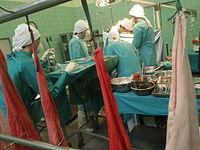
Photo from wikipedia
Lung transplant recipients (LTxRs) with acute or chronic rejection release circulating exosomes that mostly originate from donor lung tissue and express mismatched human leucocyte antigens (HLA) and lung-associated self-antigens (SAgs),… Click to show full abstract
Lung transplant recipients (LTxRs) with acute or chronic rejection release circulating exosomes that mostly originate from donor lung tissue and express mismatched human leucocyte antigens (HLA) and lung-associated self-antigens (SAgs), Collagen-V and K alpha 1 Tubulin. During lung transplant (LTx), donor lungs often undergo injuries that increase the antigenicity of the transplanted organ. 30% of LTxRs also have pre-transplant antibodies (Abs) to HLA and lung SAgs, which may induce conditions that increase the risk of chronic lung allograft dysfunction (CLAD). Post-transplant, some recipients experience de novo development of Abs to mismatched donor HLA (donor-specific antibody [DSA]) and Abs to lung SAgs, which have been implicated in CLAD pathogenesis. Because most LTxRs who develop DSA also develop Abs to SAgs, some have suggested a synergistic relationship between alloimmunity and autoimmunity in CLAD immunopathogenesis. These processes likely occur from stress-induced exosome release. Exosomes carry allo-antigens, lung SAgs, several micro RNAs, proteasome, co-stimulatory molecules, and pro-inflammatory transcription factors-resulting in efficient antigen presentation by direct, semidirect, and indirect pathways, leading to immune responses to both allo-antigens and lung-associated SAgs. This review summarizes recent findings on the role of exosomes, and processes triggering immune responses to allo-antigens and lung SAgs that ultimately culminate in CLAD.
Journal Title: Human immunology
Year Published: 2019
Link to full text (if available)
Share on Social Media: Sign Up to like & get
recommendations!